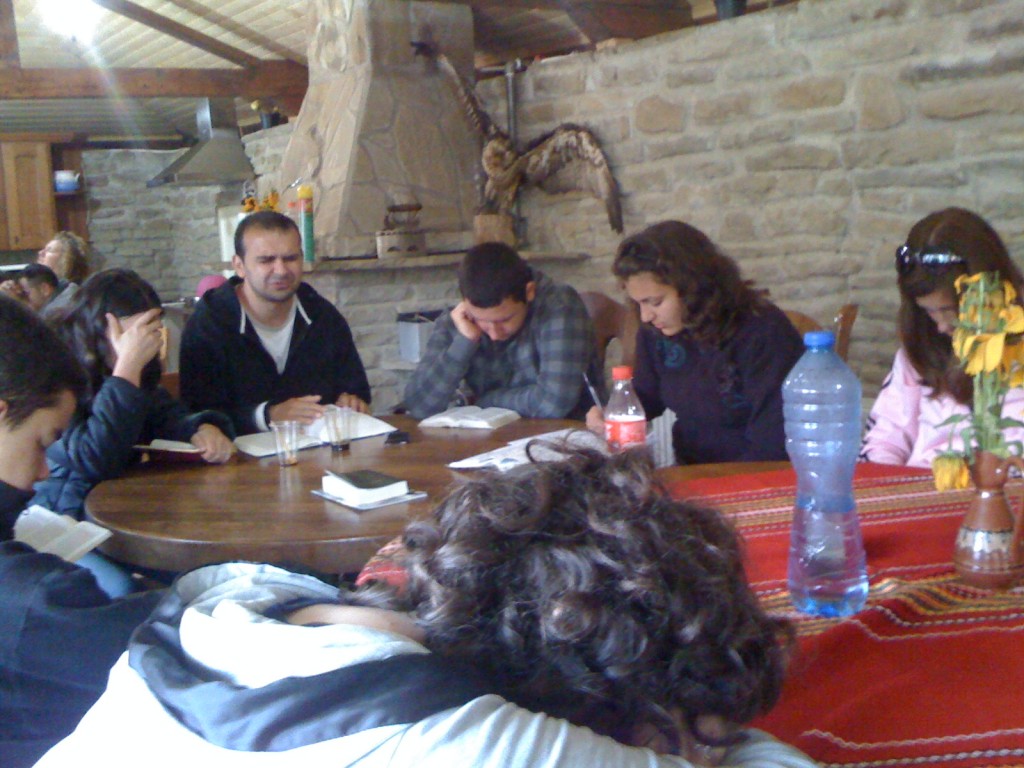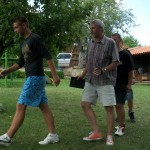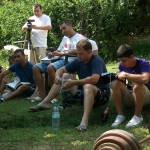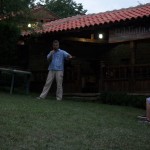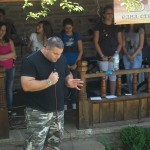Rites in the Spirit
![9781841270173[1]](https://cupandcross.com/wp-content/uploads/2013/09/97818412701731-279x300.jpg) Rites in the Spirit approaches Pentecostal practices and experiences with an approach often not seen by Pentecostals. Through identifying Pentecostal distinctiveness with rites terminology, the book proves that they have astonishing effect on the believers’ formation. In the light of Albrecht’s work this paper will reflect on: (1) ritual time, space and identity, (2) fundamental structure and modes, (3) positive consequences and (4) characteristic qualities and formational role of Pentecostal practices and experiences.
Rites in the Spirit approaches Pentecostal practices and experiences with an approach often not seen by Pentecostals. Through identifying Pentecostal distinctiveness with rites terminology, the book proves that they have astonishing effect on the believers’ formation. In the light of Albrecht’s work this paper will reflect on: (1) ritual time, space and identity, (2) fundamental structure and modes, (3) positive consequences and (4) characteristic qualities and formational role of Pentecostal practices and experiences.
Ritual Time, Space and Identity
Albrecht explains that Pentecostal experience of spirituality has effect on time as spirituality is affected by the experience itself. He further proposes three time cycles as a characteristic: (1) weekly/annual events, (2) lifetime and (3) the time of the worship service. The worship time itself contains three distinct elements: (1) the worship, (2) the message and (3) the alter service. On the same page, the author writes that in the process of the Pentecostal service momentary/spontaneous encounters with God are often present as a part of the worship.
While time forms the Pentecostal field for ritual, space provides the physical boundaries. Albrecht identifies several space related issues and their prominence for Pentecostal worship. He states that the worship space reveals the attitude of the Pentecostal congregation. He speaks of the sanctuary as a “ritual place” where the Pentecostal services are performed. In this setting, there is space for the congregation and its dynamics (congregational space) and for the leadership (platform). Finally, Albrecht properly notices that there is also an “alter space” where the congregation and leadership come together.
In the time and space of Pentecostal worship, different people assume different roles or identities. Five are pointed out by the text: (1) worshiper, (2) prophet, (3) minister, (4) learner and (5) disciple. (pp. 136-43). The Pentecostal congregation has a main role in the worship service, as the believer’s worship is viewed as a direct offering to God. The mystical element in a Pentecostal worship service is a result of the desire to experience God directly and intimately. The personal experience with God opens the worship to supernatural intervention and the ministry of the Spirit. The very presence of spiritual gifts challenges the individual believer to become a leader, while this spiritual mode is both recognized and evaluated by the congregation.
The goal of these aspects of Pentecostal worship is a personal encounter with God and spiritual transformation of the believer. In this context, the ritual time, space and identity are expressed in Pentecostal worship through preaching, prophetic uttering, healing, miracles, etc. These elements express awareness of a given individual/corporate problem/situation as spontaneous manifestations of supernatural power and leadership challenge not only the traditional leadership forms, but effect social structures as well.
Fundamental Structure and Modes
Albrecht explores the structures and modes of the Pentecostal worship. By structures he understands the elements of the service. He places several of these in the following paradigm: (1) worship and praise, (2) pastoral message and (3) altar/response as transitions occur between them. These structures reveal the role of each believer in the corporate worship. They also reflect on the needs that each individual brings in the corporate setting of the Pentecostal worship.
The modes on the other hand, deal with the emotional aspect of the service. They can be: celebrative, contemplative, officious, penitent, estates, etc. These are the ways through which the believers respond to the structure of the service. In a way, the modes are each believer’s personal expression in the unified corporate setting of the worship service.
The structure and the modes:
(1) reveal the roles of each believer in the process of the service
(2) express human concerns; these are micro rites, like singing and music, through which an expression of the believer’s humanity is given
(3) express social structure; expresses the group’s social life and role in society
(4) reveal theological relations – express theological convictions and beliefs
(5) express relationship to God as a personal experience
(6) express relationship as community – how the body comes together and how the believer acts as a part of the body
(7) accent on relationship to the worlds as a mission approach and an evangelistic attempt
Positive Consequences
(1) Liminality – has to deal with a tripartite structure that marks a significant change in status. The liminal is the moment between the before and after of the event, and is, as it were, outside of the security of these more stable definitions.
(2) Community – deals with relationships between people under liminal conditions.
(3) Reflexivity – a self-conscious examination of the individual believer in the corporate context of Pentecostal worship
(4) Transformation – deals with both the changes taking place in the believer as well as the changes in the congregation as a whole.
Characteristics Qualities and Formational Role
The characteristic qualities within Pentecostal worship have a formational role for the individual believer through:
(1) offering leadership toward the experience of God
(2) creating a community atmosphere in which spirituality, leadership, ministry and mission of the Christian community are clearly envisioned
(3) motivating the believer to both allow and implement formation in the context of the community
(4) practicing spirituality in the context of the Christian community and as a mission to the world
Spirit Filled Life Bible Review
Comments Off on Spirit Filled Life Bible Review
Several months ago, our team undertook the task of comparing and reviewing a growing number of Study Bibles appearing on the book market recently in what we called a 21st century Revival of Study Bibles. This article is part of our Study Bibles review series as outlined here: https://cupandcross.com/bible-revival/
Spirit Filled Life Bible Review
Dony K. Donev, D.Min.
The Spirit Filled Life Bible is another great example of a Pentecostal study Bible from the 90s, which sets the stage for this century’s study bibles revival. It was edited by Jack Hayford who later served as president and chancellor of King’s University (formerly The King’s College and Seminary). The text provides Bible commentary from a conservative Pentecostal perspective and study notes are a bit more detailed than the Fire Bible.
For example, the first Old Testament control passage we use in our study from Number 6 is well documented and discussed almost verse by verse. Under the title of “Priestly Blessing,” the Spirit Filled Life Bible makes the case for: (1) wave offering as part of worship (v.20), (2) personal blessing through the singular “you” in the original Hebrew (v.22), (3) a definition of blessing (v. 24) and much more on the final phrases in the blessing: “make His face shine upon you” and “lift up His countenance upon you.”
Jeremiah 18 also has several historical commentaries in the Spirit Filled Life Bible as part of Jeremiah’s laments described in a note in ch. 11. The point here is being made that the responsibility for the law in the Old Testament was given to the priest.
The doctrine of the Rapture is commented in Revelation ch.4 in both the footnotes and a special block note within the text. The first one gives three views of the Last Days (dispensational, futurist and historic/preterist), while the second correlates with the elements of John’s vision. The Dispensational interpretation is offered in continuity with the interpretation of the 7 Churches of Asia-Minor. Two other block notes with markings “Word Wealth” and “Kingdom Dynamics” are placed in 1 Thess. 5 explaining the origin of the word “Rapture.” The significant for Pentecostals phrase “in the Spirit” is explained as “a state of heightened spiritual sensitivity.”
The Tribulation is also clearly explained as post-Rapture event with a classic interpretation of the prophecy given in the text of Daniel 8. The 24 elders are viewed as “evidence of the church’s exemption from the Great Tribulation” as they “are already glorified, enthroned and crowned,” which without a doubt proceeds from pre-Millennial doctrinal interpretation.
The doctrine of the Trinity is preserved as per the Biblical Truths of the Foursquare Church, namely: “Trinity of God the Father, God the Son and God the Holy Spirit.” Thou the word “Trinity” itself is absent from the detailed word Concordance at the end of the Spirit Filled Life Bible, perhaps because it is not present in the actual Biblical text, it is persistently present in the commentaries. This is true even in the largely disputed (from a manuscript point of view) 1 John 5:5-6 which is explained as Trinitarian in the comments.
Similarly to the Fire Bible, the Holy Ghost baptism is explained in the forward to Acts along with a page full with notes on speaking in tongues in Acts ch. 2. Additionally, there is a chart with a six-fold involvement of the Holy Spirit in human history: in the beginning, the Old Testament and Old Testament prophecy, in salvation, the New Testament and in the written word. The Spiritual Gifts in 1 Corinthians 12 are discussed one by one. There’s also a very nice write-up at the end by Paul Walker of the Church of God who further explains “Holy Spirit Gifts and Power.”
The commentary notes at the end contain a self-guide by Pat Robertson, named “Spiritual Answers to Hard Questions.” Power over demons is explained along with the process of exorcisms, without explicit statements about the influence of demons over born-again Christians. The following subject on the Kingdom of God is also dealt with without any explicit reference to Kingdom Now Theology, although explicitly lengthier and detailed in comparison to the rest of the subjects. The final note deserves special attention and should be hereby quoted in place of an epilogue: “Lack of forgiveness blocs access to the kingdom (of God) and its marvelous power. (See also Mt. 6:5-15; Mark 11:22-26).”
Spirit, Pathos and Liberation
 The research presents Hispanic Pentecostalism as “the voice of the voiceless.” Solivan prepares the reader for the cultural and religious context in which orthodoxy has failed for various cultural, historical and theological reasons. He further proposes that the new term of “orthopathos” should be used. Orthopathos is the combination of orthodoxy (what we believe) and orthopraxis (what we do). As such, it introduces an interlocutor between God and humanity and between beliefs and works. God is the God who suffers for creation and with creation. The act of repentance is then the human response to the passion of God for humanity and joining with His sorrow in the death and alienation of mankind. Such appeal is against the dehumanization of revelation. It reduces the salvific experience to a simple claim of Biblical truths based on a logical choice.
The research presents Hispanic Pentecostalism as “the voice of the voiceless.” Solivan prepares the reader for the cultural and religious context in which orthodoxy has failed for various cultural, historical and theological reasons. He further proposes that the new term of “orthopathos” should be used. Orthopathos is the combination of orthodoxy (what we believe) and orthopraxis (what we do). As such, it introduces an interlocutor between God and humanity and between beliefs and works. God is the God who suffers for creation and with creation. The act of repentance is then the human response to the passion of God for humanity and joining with His sorrow in the death and alienation of mankind. Such appeal is against the dehumanization of revelation. It reduces the salvific experience to a simple claim of Biblical truths based on a logical choice.
Several reasons are given to prove that such intercalative paradigm is necessary for the Hispanic Pentecostal communities. Among them are not only Biblical, theological and mission requirements, but also sociopolitical, ecumenical and identity ones. These necessities expand the orthopathic approach beyond the church-religious context into the area of social transformation, thus proposing it as a larger paradigm for Christian mission to the world. Solovan claims that pathos denotes the idea of goodness and passion, which were very often missed by the ecclesial formations which followed the early church and was never properly restored by the Reformation. The discussion addresses the imago Dei and the pointed by Tertullian’s argument that God’s expression of passion is not a reflection of ours, but rather a reflection of His image.
Having established the pathos idea, Solivan goes further with showing how orthopathos can become a means of human liberation even through suffering. Three theological principles of orthopathos are presented as follows:
1. In connection with the Biblical principle of identification.
2. In connection with the Biblical principle of location.
3. In connection with the Biblical principle of transformation.
Through the Biblical foundation, the starting point of orthopathos is identified with the suffering and its relations to the category of poverty within the socioeconomic matrix. The author continues with a parallel between suffering and the work of the Holy Spirit and His work among the poor.
Once, the pneumatological factor is introduced, Solivan goes a step further to discuss Pentecostal glossolalia. He sees it as an affirmation of the work of the Spirit among the poor. This gives a Pentecostal conclusion of the orthopathos topic and allows the author to explore its practical implementation within the Hispanic Pentecostal community.
The book further introduces three critical questions concerning the topic of orthopathos. The first one is concerned with the imago Dei in reference to the emerging identity of Hispanic Americans and more specific Hispanic American Pentecostals.
The first concern is continued by the second question about the common experiences and culture in the context of North American immigration dynamics. This factor has a rather unicultural and ecumenical approach, but brings several interesting possibility for communality within the Holy Spirit. The third concern deals with the transformation of practice into praxis in a Pentecostal context and is connected with the last question which calls against passivity toward suffering and poverty. The book concludes with a call for social transformation which is addressed by Pentecostal theology and praxis.
Practical Implementation
In the background context of the treated problems and issues, the book inevitably stands against passivism toward social injustice and touches on the role of the church in the social transformation dynamics. Although, the book is dedicated to a Hispanic Pentecostals, the principles of social transformation are applicable also in my area of ministry in postcommunist Bulgaria. The similarities are many.
First, just like South America, Eastern Europe after the Fall of the Berlin wall in 1989 is struggling economically. Along with the social and political instabilities in the region, the economical crises have separated the Bulgarian community into a small percentage of extremely rich, and a majority of extremely poor with minimal or no middle class separation between them.
Second, while South America’s religion is monopolized by the Catholic Church, this role in Bulgaria has been occupied by the Eastern Orthodox Church. The last has been credited as the protector of the Bulgarian culture during the Turkish Yoke and the Communist Regime. However, in both cases, the Eastern Orthodox Church has participated in historical dynamics which have created environments for the rich and powerful minorities, thus oppressing the poor and the underprivileged majorities.
Thirdly, through the Protestant missions Pentecostalism was introduced to the Bulgarian culture in the 1920s. Today it is the fastest growing religious movement in Eastern Europe. Protestantism has rightly and faithfully fulfilled its role as a sociological factor in the formation of the Bulgarian culture exactly in the historical moments when the Eastern Orthodox Church has been or had chosen to become socio-culturally inactive.
Fourth, cross-cultural problems which Hispanic communities in North Amerca face are similar to the problems which Bulgarian immigrant communities face. The cross-cultural processes, struggle with identity, loss of heritage, as well as their recovery and reclaiming through the Biblical salvific experience, are dynamics which essential for the Bulgarian immigrant communities and the Bulgarian immigrant individually.
Finally, Pentecostalism has drawn a paradigm for personal and social transformation which has created an environment for liberation of the oppressed by postcommunist reality Bulgarians both in Bulgaria and internationally. It has further effectively addressed theological and practical issues through Pentecostal identity, experience and community becoming a factor within the social transformation and the postcommunist mentality as well. As such Pentecostalism, in a larger scale, has become an answer for many through providing answers to existential questions in the midst of crises, transitions and insecurity as its call for orthopathos has integrating the sacrifice of God with the present search and suffering of the Bulgarian nation.
The Liberating Spirit
![9780802807281[1]](https://cupandcross.com/wp-content/uploads/2013/07/97808028072811.jpg) The Liberating Spirit is an analytical examination of the Pentecostal movement in the Latino community. Pentecostalism is presented as a social transformation factor. The research is written for a scholarly audience, though it is understandable by the common believer as well. It argues for a “pneumatic” social ethic, and urges Pentecostals to move beyond selective preaching of salvation and to address such systemic issues as human rights, social injustice, racism, etc.
The Liberating Spirit is an analytical examination of the Pentecostal movement in the Latino community. Pentecostalism is presented as a social transformation factor. The research is written for a scholarly audience, though it is understandable by the common believer as well. It argues for a “pneumatic” social ethic, and urges Pentecostals to move beyond selective preaching of salvation and to address such systemic issues as human rights, social injustice, racism, etc.
The study follows a well developed structure which integrates Pentecostalism and social transformation within the context of a Hispanic American culture. Chapters one and two of the study deal with the Hispanic American culture through focusing on the Hispanic immigration in North America. Chapter three is an overview of the Hispanic Pentecostal reality to identify the Pentecostal church as a center for liberation from oppression in the context of Pentecostal eschatology. Chapter four provides Scriptural proof for the presented ideas, and chapter five concludes the research with a presentation of social ethic for the Hispanic American Pentecostals.
Pentecostal churches are presented as traditionally unlearned in their majority, but always open to the needs of the poor among them. Villafane even speaks of “menesteroso” (the oppressed) as a main focus of concern of the Pentecostal churches. Since its beginning the movement has emphasized the inclusiveness of the Christian community existing in the context of Christ’s love for all with special emphasis on the poor, suffering, sick and oppressed.
Being concern with all of these, Pentecostalism has viewed the pneumatic theology and praxis not only as a heritage of its ethos, but also as means through which social justice is made possible within the church and the world which the church reaches through ministry. In the pneumatic part of the research, the author responds to Karl Barth’s dream for theology of the Spirit. Villafane sees Pentecostalism as the movement that brings such theology.
In relationship to the immigration dynamics, the author gives an extensive overview of the Latin American immigrants and the way they experience their ethnic belongingness. Villafane shows that Latin American immigrants form at least four groups of language preferences (1) English only, (2) Bilingual with English preferences, (3) Bilingual with Spanish preferences and (4) Spanish only. This division is somewhat different than the Bulgarian language preference. At this present time, research shows that all Bulgarian immigrants speak some English but prefer Bulgarian among them. Also, all Bulgarian-born immigrants have studied Russian beside Bulgarian and English, but do not use it in their communication within or outside of the Bulgaria community. And finally, at this time there is no English only preference group among the Bulgarians. Perhaps such will be formed when a second generation of Bulgarian immigrants emerges in America.
Another interesting point of difference is the ethnos of the immigrant communities. Villafane shows that Latin American immigrants represent five such groups as follows:
- Mexicans 61%
- Puerto Ricans 15%
- Cubans 6%
- Central and South America 10%
- Other Nations 8%
The ethnic structure of the Bulgarian immigration in North America is close to the ethnic ratio in the Bulgarian nation which are: Bulgarians 80%, Turks 12%, Roma (6%) and others 2%. This presents several major differences between the Latin American and Bulgarian diasporas which are:
(1) The Latin American diaspora represents a much larger ethnic and geographical area from which immigrants have come than the Bulgarian one.
(2) The Latin American diaspora represents a much larger immigrant group in North America, with a longer history and large geographical location than the Bulgarian one.
(3) The Bulgarian diaspora represents a less defragmenter community as a large majority (80%) is Bulgarians. In the Latin American case almost 50% of the immigrants are with different ethnic background.
(4) The Bulgarian diaspora represents a different ethnic group, which differ not only by national belongingness, but by language as well.
In this context it must be critically noted that until recently cultural assimilation was considered an inevitable fact which can be prevented neither by the assimilating culture nor by the assimilated culture. It was considered that once a group of two or more cultures meet, assimilation begins. In America, however, assimilation is no longer seen as an inevitable process. Instead a cultural diversity exists in a rather mosaic structure described by the term “segmented assimilation.” Such phenomenal ethnic formation derives from the multiplicity of lifestyles and worldviews that formed a contemporary American culture. The technical term for this new mixing is “transnationalism.”
Villafane’s research further offers an in-depth overview of the Latin American communities in North America examining their culture and paradigms and influence of Pentecostal ministry among them. The text speaks of the “homo socius” or the person in the context of community, claiming that an individual is only a person when acting in the social context. A certain transformation from one social context to another is also suggested when viewed in cross-cultural dynamics of immigration, assimilation and naturalization. These processes are similar within the Bulgarian immigrant communities in North America in relation to the ministry of Protestant churches among them.
The Bulgarian Christian communities are searching for a model of adjustment to the assimilating culture in which they exist. This can be accomplished by adopting a strategy of incorporating the postmodern setting of worship, theology and praxis within the Bulgarian Christian community. It should be accompanied by an intentional process of liberation from the dysfunctional model through which the Bulgarian Protestant Church operated during the Communist Regime (1944-1989). This process should purpose to liberate the believers from an oppression mentality and transform them toward the mind of Christ, in order to minister effectively in the present context of existence. Failure to address this present dilemma will result in an inability of the Bulgarian Christian community to communicate its faith and to minister to the younger, faster-adjusting generation of Bulgarian-Americans, whose religious belongingness remains unexplored and often even unknown to themselves.
In all cases, the Bulgarian Evangelical churches accept the responsibility of being much more than a religious center, as it serves as a social and ethno-cultural center as well. Thus, in the context of ethic assimilation and cultural regrouping, the Bulgarian churches not only remain a protector of the Bulgarian ethnicity and the Bulgarian way of life, but also acts as an agent of cultural integration. Naturally, as such it has received the attention of Bulgarian immigrants who have altered it to meet present needs.
Azusa Lecture, Spirit of Azusa Award to be Presented
![pic-c_thomas[1]](http://ourcog.org/wp-content/uploads/2012/10/pic-c_thomas1.jpg) On Tuesday, October 30, 2012, the annual Azusa Lecture Series will take place and will include a lecture by John Christopher Thomas and presentation of the Spirit of Azusa Award to Dr. French Arrington. The event will take place at 7:00 P.M. at the North Cleveland Church of God Bryant Fellowship Hall and is free and open to the public.
On Tuesday, October 30, 2012, the annual Azusa Lecture Series will take place and will include a lecture by John Christopher Thomas and presentation of the Spirit of Azusa Award to Dr. French Arrington. The event will take place at 7:00 P.M. at the North Cleveland Church of God Bryant Fellowship Hall and is free and open to the public.
On April 14, 1906, a group of African Americans under the leadership of William J. Seymour established a mission at 312 Azusa Street in Los Angeles, California. They had been holding services at a nearby home on Bonnie Brae Street, but when people began to speak in tongues and experience divine healings the crowds became too great for the residential neighborhood. Spiritual expectation, newspaper articles, and the San Francisco earthquake four days later increased attention to what God was doing in the small mission. Soon people began arriving from around the world to seek their personal “Pentecost.” Many were compelled to take the message to the nations, birthing the greatest missions movement in the history of Christianity. Individuals, congregations and denominations were swept into the new Pentecostal Movement. When mainline Protestant and Roman Catholic Christians also began to experience the baptism of the Holy Spirit, the twentieth century came to be called “The Century of the Holy Spirit.”
Speaker John Christopher Thomas is the Abbott Professor of Biblical Studies at the Pentecostal Theological Seminary and serves as associate pastor of the Woodward Avenue Church of God in Athens, Tennessee. A founding editor of the Journal of Pentecostal Theology, Thomas edits the journal’s supplemental series of books and is general editor of the Pentecostal Commentary Series. An internationally recognized Bible scholar, Thomas directs the Centre for Pentecostal and Charismatic Studies at Bangor University in Wales as well as the Centre for Pentecostal Theology in Cleveland, Tennessee. Among his seven books is the newly released commentary on the Book of Revelation, The Apocalypse.
Spirit of Azusa Award recipient French L. Arrington is Professor Emeritus of New Testament Greek and Exegesis at the Pentecostal Theological Seminary, having served for 21 years on that faculty as well as 17 years at Lee College. While at Lee, he was chairman of the Bible and Theology Department and honored with the Excellence in Teaching Award. A former pastor, Arrington has written extensively for ministerial and lay enrichment in the local church. His latest book is The Greatest Letter Ever Written: A Study of Romans.
WAR ON THE SAINTS: Revival Dawn and the Baptism of the Spirit
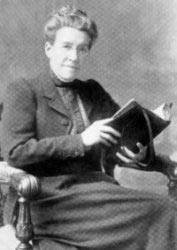 The name of Jessie Penn-Lewis often occurs in works related to the Welsh revival of 1904, not surprisingly, as she was a major chronicler of the movement. She wrote an article each week in the “The Life of Faith,” tracing the course of the spiritual movement first throughout Wales, and then through many lands and by many individuals. She contributed to a number of periodicals and produced her own history of the revival called “The Awakening in Wales – and Some of its Hidden Springs.” She is also well known for her extreme caution regarding what she perceived to be possible demonic intrusions in the developing Pentecostal work of her day, and her later involvement with Evan Roberts. We have included the entire chapter.
The name of Jessie Penn-Lewis often occurs in works related to the Welsh revival of 1904, not surprisingly, as she was a major chronicler of the movement. She wrote an article each week in the “The Life of Faith,” tracing the course of the spiritual movement first throughout Wales, and then through many lands and by many individuals. She contributed to a number of periodicals and produced her own history of the revival called “The Awakening in Wales – and Some of its Hidden Springs.” She is also well known for her extreme caution regarding what she perceived to be possible demonic intrusions in the developing Pentecostal work of her day, and her later involvement with Evan Roberts. We have included the entire chapter.
Chapter XII: Revival Dawn and the Baptism of the Spirit.
We have seen that the period in the believer’s life wherein he receives the Baptism of the Holy Spirit is the special time of danger from the evil supernatural world, and the Baptism of the Spirit is THE ESSENCE OF REVIVAL. Revival dawn, is, therefore, the great moment for deceiving spirits to find entrance into the believer by deception through counterfeits, resulting sometimes in the possession dealt with in preceding pages.
The hour of Revival is a time of crisis and possible catastrophe. A crisis in the history of every individual, as well as in the history of a country, a church, or a district. A crisis for the unregenerate man, wherein he settles his eternal destiny, as he accepts, or rejects conversion to God; a crisis to those who receive the fulness of the Holy Spirit, and to those who reject Him; for to the believer who bends and receives the Holy Spirit, it is the day of the visitation of the Most High, but to others it means the decision whether they will become spiritual men or remain carnal (1 Cor. iii. i); whether they will elect to remain in defeat in the personal life, or determine to press on as overcomers. Few go through the crisis without deception by the enemy in more or less degree, and only those who cling to the use of their reasoning faculties at this time, can hope to be saved from the catastrophe of becoming a victim to the subtle workings of evil supernatural powers. If the believer does become deceived by evil spirits at the time that he is baptized with the Spirit, almost immediately after the highest point of his experience, he begins through deception to descend into a pit which ultimately means depth of darkness, bondage and misery, until he is undeceived and returns to the normal path. Those who do not discover the deceptions, sink into deeper deception, and become practically useless to God and to the Church.
REVIVAL THE HOUR AND POWER OF GOD
Revival is the hour and power of God, and of the devil, for the descent of the Divine power brings the accompanying onslaught of evil supernatural powers. It means MOVEMENT IN THE SPIRITUAL REALM. Revival itself is the hour of God, when heaven is opened, and the power of God works among men, but when the Divine power appears to pass away, and evil supernatural powers manifest their workings in a man, or a church, or a country,then men marvel that the devil’s work should be where God had been so manifest, not knowing that the devil was planting his seeds, and DOING HIS WORK, FROM THE DAWN OF REVIVAL. Revival ebb began with its flow, but all unseen.
In the hour and power of God in Revival, the “Tempter” appears to be absent, but he is present as the Counterfeiter. Men say there is ”no devil,” and yet it is his greatest harvest time. He is netting his victims, mixing his workings with the workings of God, and beguiling the saints more effectively than he was ever able to do with his temptations to sin. As a counterfeiter, and deceiver, the ever-watchful foe uses his old methods of deception and guile on new converts, who, having victory over known sin, think the Tempter has left them, not knowing his new ways. His absence is only apparent, and not real. Satan was never more active among the sons of God.
WHY REVIVAL STOPS
The Devil’s great purpose is to stop the Revival power of God, and every Revival that has been given of God to awaken His people, has ceased after a time, more or less short, because of (i) the Church’s ignorance of the laws of the spirit for co-working with God; and (2) the insidious creeping on of the powers of darkness, unrecognized, and yielded to by the people of God through ignorance. Those who are born of the Spirit at such a period of the manifested power of the Holy Spirit emerge into a spiritual world, where they come into contact with spirit-beings of evil, OF WHOSE EXISTENCE THEY HAVE NO EXPERIMENTAL KNOWLEDGE. They become conscious of spiritual forces and things which they think must be of God, and they do not know of the possibility of workings mingled by wicked spirits with the things of God. This is the reason why Revival, which quickens the Church, and for a period manifests to the world the regenerating, uplifting power of God, produces as an aftermath a number of genuine Spirit-born believers who are said to have “religious mania,” or are called “cranks.” And this is why “Revival” is sooner or later checked and discredited, the testimony to the world destroyed, the sober section of the Church dismayed, and made fearful of its effects.
To put it in bluntest language, the Revival hour is the occasion for evil spirits to obtain “possession” of spiritual believers, and REVIVAL CEASES BECAUSE OF SUCH POSSESSION. The most spiritual believers, baptized with the Holy Spirit, and most fitted to be used of God in Revival service, may become deceived and possessed by evil spirits in their outer being THROUGH ACCEPTING THE COUNTERFEITS OF SATAN. Believers who are not so abandoned to the Spirit escape the acute “possession,” but in their contact with hitherto unknown workings from the spiritual realm, are equally open to deception which is manifested in a less recognizable way. What is called the “fanatical” spirit, which in some degree, follows Revival, is purely the work of evil spirits. At Revival dawn the ignorant are teachable, but through their “spiritual experiences,” later on they become unteachable. Pre-Revival simplicity gives place to Satanic “infallibility,” or an unteachable spirit. Dogged, stubborn obstinacy in a believer after Revival is not from the source of the man himself, but from evil spirits deceiving his mind, holding his spirit in their grip, and making him unbending and unreasonable. The scheme of the powers of darkness in Revival dawn, is to drive, or push to extreme, what is true. Their “push” is very slight and imperceptible at the beginning, in suggesting thoughts, or impelling to actions a very little contrary to reason, but as the “push” is yielded to, and the use of the reason is silenced, those who are thus deceived in due course become fanatical. The judgment of those believers impelled to unreasonable actions, may be against, and even resisting the things they are supernaturally urged to do: yet they are unable to stand against the supernatural power driving them, which they think and believe is from God.
REVIVAL AND WAR ON SATAN
All this, and much else already dealt with in preceding pages, together with the after history of all Revivals of the past, shows that REVIVAL MINUS WAR ON SATAN AND HIS WICKED SPIRITS, must always appear to end in partial failure through the mixed results, consequent upon Satanic counterfeits of the working of the Holy Spirit.
The Church, therefore, sorely needs believers equipped with knowledge and discernment, to meet the Satanic counterfeits which invariably follow the advent of Revival, knowing the symptoms of Satanic deception and possession, and able to resist the powers of darkness, and teach the children of God the way of victory over them, as well as the aggressive warfare upon them. War upon the attacking spirits of evil is indispensable for maintaining the health, sanity and spiritual power of those who are revived. A PURE REVIVAL–free from the usual aftermath–is POSSIBLE if the Church understood the truth about the powers of darkness, as well as the way of co-operation with the Holy Spirit. Apart from this same knowledge of the workings of Satan and his wicked spirits, so as to be able to recognise their presence under any guise, no one can with safety accept all the supernatural manifestations which accompany Revival, or believe all Seeming “Pentecostal power” to be of God. A PURE Revival is Divine power in full operation, minus sin and Satan. It is not cold “belief,” but life, and it has to do with the spirit, not the intellect.
PRAYER FOR REVIVAL
Apart from this same knowledge, those who pray for Revival do not clearly understand what they pray for, nor how to act when their prayers are answered; for they are not prepared to meet the Satanic opposition to their prayers; nor even the dangers attendant upon prayer for Revival.
Why is there not yet world-wide Revival in answer to world-wide prayer? For the same reason that Revival subsides when it has begun, and that prayer meetings for Revival may end in catastrophe, or powerlessness. The check to Revival, both when it has begun, and in the prayer preceding its advent, is caused by the spirits of evil deceiving or hindering the praying ones. The hindrance to Revival, at the present time lies, not only in this opposition of the powers of darkness, but in the PRESENT CONDITION OF THE MOST SPIRITUAL SECTION OF THE CHURCH, through whom alone God can work in Revival power. These are the believers who know the Baptism of the Holy Spirit, and were liberated in spirit in the Revivals of the last decade, but who are now driven back into themselves by the pressure of the enemy in the atmosphere, or else are in captivity to the foe through his counterfeits. Let these quenched or deceived believers be liberated once more, and THOSE WHO ARE NOW USELESS WILL BE PRICELESS IN VALUE for teaching and strengthening others when Revival is once more given.
INSTRUMENTS FOR REVIVAL
The Holy Spirit is still in those who were baptized with the Spirit, during the last Revivals. The mistake at the time of the Revival in Wales in 1904 was to become occupied with the effects of Revival, and not to watch and pray in protecting and guarding the cause of Revival. The Spirit baptized souls, at present locked up in spirit, or side-tracked through Satanic deceptions, are still those who would be the instruments through whom God could work, were they but set free. Useless now, but priceless in maturity, and experience and knowledge for the guiding and guarding of a Revived Church, when they are once more liberated for true co-working with the Holy Spirit of God.
How, then, should the Lord’s praying ones pray at the present time? They should pray (i) Against evil spirits now blocking and hindering Revival. (ii) For the cleansing and delivering of those who became possessed through deception during the time of later Revivals. (iii) That when Revival is once more given it may be kept pure, and (iv) For the preparation of instruments for Revival, trained and taught of God to guard against further inroads of the powers of darkness. In brief, let all who pray for Revival, pray for light to reach those who HAVE BEEN ENSNARED INTO BONDAGE TO THE DECEIVING POWERS OF DARKNESS, that they may be set free, and once more become usable in Revival service; then will the forces of evil be beaten back from the ground they have regained, which still belongs to God. The Baptism of the Holy Spirit is the essence of Revival, for Revival comes from a knowledge of the Holy Spirit, and the way of co-working with Him which enables Him to work in Revival power. The primary condition for Revival is, therefore, that believers should individually know the Baptism of the Holy Ghost. This term being used as a convenient expression for describing a definite influx of the Holy Spirit which thousands of believers throughout the Church of Christ have received as a definite experience. Such an infilling of the Spirit was the cause not only of the Revival in Wales in 1904, but of all other Revivals in the history of the world. The fact that the counterfeiting work of Satan follows Revival through such an opening of the spiritual world as enables the evil spirit-beings to find access to believers under the guise of the Divine Spirit, must not hold back the children of God from seeking the true flood tide of the Spirit, for the bringing about of pure Revival, and the emancipation of the Church of Christ from the bonds of sin and Satan.
WHAT IS A TRUE BAPTISM OF THE SPIRIT?
It is of primary importance to understand what is a true Baptism of the Spirit, the conditions for its reception, and the effects of obtaining it. Previous chapters will have thrown much light upon what it is not, and the dangers to be avoided in seeking it. It is not an influence coming upon the body, nor, according to the records in the Acts of the Apostles, does it result in physical manifestations, such as convulsions, twitchings and writhings of the human frame; nor does it rob a man of the full intelligent action of the mind, or ever make him irresponsible for his speech and actions.
In brief, the place of the indwelling of the Spirit of God in man, gives the key to all the true manifestations connected with the Baptism of the Spirit, as well as the conditions for receiving it, and the results in personal experience and service. THAT PLACE IS THE HUMAN SPIRIT. Once let the believer understand that his SPIRIT lS the organ through which the Holy Spirit carries out all His operations in and through him, he will be able to discern the true meaning of being filled with the Holy Ghost, and how to detect the counterfeit workings of Satan in the realm of the senses. The Baptism of the Holy Spirit may be described as an influx, sudden or gradual, of the Spirit of God into a man’s spirit, which liberates it from the vessel of the soul, and raises it into a place of dominance over soul and body. The freed spirit then becomes an open channel for the Spirit of God to pour through it an outflow of Divine power. The mind receives, at the same time, a clarifying quickening, and the “eye of the understanding” is filled with light (Eph. i. I8). The body becomes entirely under the man’s complete control, as the result of the dominance of the spirit, and often receives a quickening in strength for endurance in the warfare service he finds he has emerged into. That the Spirit of God OPERATES THROUGH THE ORGAN OF A MAN’S SPIRIT, as shown in the epistles of Paul, needs to be kept in mind in reading the records of the working of the Holy Spirit in the Acts of the Apostles.
THE INFLUX OF THE HOLY SPIRIT AT PENTECOST
On the day of Pentecost, the 120 disciples–men and women–were filled in the spirit, as the Spirit of God filled the atmosphere, and their tongues were liberated, so that THEY THEMSELVES as intelligent personalities, could speak of the mighty works of God as the Spirit gave utterance, i.e., gave them power to speak. The record gives no hint that they became automatons, or that the Spirit spoke HIMSELF through them, or INSTEAD of them. From a spirit under the clothing of, and the afflatus of the Spirit of God, they themselves were given intelligent insight into, and utterance about, the wonderful things of God, as they were “moved” in spirit by Him. This influx of the Divine Spirit into their spirits, not only left their mental powers in full action, but clarified them, and increased their keenness of discernment and power of thought, as seen in the action and the words of Peter, who spoke with such convincing power that through his words–inspired by the Spirit, but spoken by him in intelligent clearness of mind–three thousand were convicted and saved, the true influence of God the Holy Spirit being manifested through him, not in “control” of those who heard him, but in a deep conviction in their consciences which turned them to God, not conquered by terror of God, but by a godly awe, which led them to godly sorrow and repentance. The “falling upon” of the Spirit (Acts xi. I g), is therefore upon the spirit, clothing it with Divine light and power, and raising it into union of spirit with the glorified Lord in heaven; at the same time, baptizing the believer into one spirit with every other member of the mystical Body of Christ, joined to the Head in heaven. All who are thus liberated and clothed in spirit are “made to drink of one Spirit” (I Cor. xii. 13)–the Holy Spirit–Who then, through the spirit capacity of each member of the Body, is able to distribute to each the gifts of the Spirit, for effective witness to the Risen Head, “dividing to each one severally even as He will.” (See Cor. xii. 4-11).
THE HOLY SPIRIT REVEALING CHRIST IN HEAVEN
Another aspect of the true Baptism of the Spirit, having an important bearing upon the experiences of believers to-day, is to be found in the words of Peter on the Day of Pentecost, showing that the revelation of Christ given by the Holy Spirit at such a time, was of Christ as the glorified Man in heaven (Acts ii. 33,34), and not in any vision or manifestation as a Person within. The same attitude to Christ as seated on the right hand of God, is uniformly to be seen in all the later records of the work of the Spirit in the Acts of the Apostles. The martyr Stephen sees the “Son of Man, standing on the right hand of God” (Acts vii. 56), and Paul on the road to Damascus is arrested by a light from heaven (Acts ix. 3; xxii. 6; xxvi. I3), out of which clothing of light the Ascended Lord spoke to him, saying, ”I am Jesus”
The Holy Spirit fills the human spirit of the believer, and communicates to him the very Spirit of Jesus, joining him in one spirit to the Spirit of the glorified Lord, imparting to him the life and nature of Christ for the building up of a new creation in His likeness (Rom. viii. 29; Heb. ii. 2-13). Instead of being turned inward to a self-centred apprehension of Christ, he is, by the influx of the Spirit of God into his spirit, lifted, so to speak, out of the narrow limit of himself, into a spiritual sphere where he finds himself one spirit with others who are joined to the Living Head forming one Body–or spirit organism– for the influx and outflow of the Spirit of the Lord.
REVIVAL DEPENDS UPON TRUE UNDERSTANDING OF THE BAPTISM OF THE SPIRIT
This aspect of the true meaning of the Baptism of the Spirit and its spiritual effect, has an important bearing upon Revival, and the reason why Revival does not come.
Revival is an OUTFLOW OF THE SPIRIT OF GOD THROUGH THE ORGAN OF THE HUMAN SPIRIT LIBERATED FOR His USE. When the influx of the Spirit takes place into the spirits of many believers, and finds outlet through all, the unity which was so marked in the early Church is seen, and the united power becomes strong enough to overflow through all these liberated ones to others. But if the believer turns INWARD, either (I) through the pressure of opposition, (2) powers of darkness in the atmosphere, or (3) to worship and pray in a self-centred way; or is occupied in any degree with an inward experience, THE OUTFLOW OF THE HOLY SPIRIT IS HINDERED; the unity with other liberated believers is checked by an invisible barrier, which has come between, and the released spirit, which was kept dominant over soul and body so long as the man turned outward as a channel for the inflow and outflow of the Holy Spirit, sinks down into the soul-vessel, a “spirit in prison”, so to speak, once more. “Revival” is then checked at its very birth, because believers who seek, and obtain a Baptism of the Spirit, do not clearly understand the conditions upon which the inflow was given, nor how to co-operate with the Holy Spirit in the purpose of His coming; which is to make them channels for the OUTFLOW of rivers of living water.. The influx of the Spirit of God to a man’s spirit, means love, joy, and liberty, buoyancy, light and power. It means a revelation of Christ as the Risen and Ascended Lord, which brings joy unspeakable and full of glory; and an intimate sense of His nearness in fellowship and communion, which makes the “I in you” a living power. It is at this time that ignorance is dangerous. If the believer does not understand that all this is an EFFECT WHICH IS INWARD AS A RESULT OF THE UNION WITH CHRIST IN HEAVEN, and an effect which will continue only so long as he abides in the right attitude toward the glorified Christ in heaven, he will turn into and sink down into the soul, I.e., into himself; and then the deceiving spirits will counterfeit in the sense-sphere the true experiences which he had IN SPIRIT through the incoming of the Holy Ghost. These ”experiences” then have little result beyond the circumference of the believer. When the true influx of the Holy Spirit to the spirit took place, there was (I) unity with others in the same Spirit, (2) joy, (3) liberty of’ utterance, (4) power to witness to Christ, (g) effective and permanent results in the lives of others, and a heavenly “fire” from God in a burning, consuming white heat intensity of SPIRIT (Rom. xii. II) in service to God. But when the sense counterfeit takes place, supernatural “experiences” frequently occur at the very same time that a wrong spirit is discernible, such as harshness, bitterness, pride, presumption, disunion, etc., showing either (I) that the “experiences” are not from the spirit, or (2) that the spirit is out of co-working with the Holy Spirit, and (3) the Holy Spirit is no longer able to bring forth the pure fruit of the Spirit through the believer’s Spirit and life. (Footnote:This may only be temporary, until the believer becomes conscious that something Is wrong, and he takes steps to regain his right condition of spirit, when the Holy Spirit again manifests His Presence and power.) The after counterfeit of the true is also marked by, (1) inability to recognize and unite with the Spirit of God in others, this being contrary to the pattern of the oneness of the Body shown in I Cor. xii., where the same Spirit in each member is in harmony with the Spirit in the other; (2) the spirit of separation and division on account of not seeing eye to eye in non-essential matters, for union of spirit, where the Holy Spirit is ruling and working, is possible apart from unity of faith, which can only be according to the degree of knowledge.
WHY BELIEVERS DO NOT OBTAIN THE BAPTISM OF THE SPIRIT
Believers who know that a Baptism of the Spirit is possible, and obtainable by them, may not receive that Baptism because of many misconceptions about experiences.
The reception of the Holy Spirit, and the Pentecostal measure of the enduement, or clothing, of the Spirit, vary in manifestation and result according to the preparation of, and the knowledge of the believer. Many do not receive the Baptism of the Spirit, because they have misconceptions which hinder them from co-operation with the Spirit of God in His workings, on account of these varying facts in connection with it, and the consequent apparent contradictions of teaching about it.
THE RECEPTION OF THE GIFT OF THE HOLY SPIRIT
After the manner, of the Lord’s dealing with His disciples, and borne out in the experience of many today, it is clear that there is a reception of the Holy Spirit answering to the experience of the Easter Day, as the initial stage of the manifestation of the Holy Spirit in enduement of power, by an influx of the Spirit of God into the human spirit, which liberates the man for utterance and witness bearing. The reception of the Holy Spirit in its initial form requires certain conditions which the believer should be able quickly and simply to fulfil. The (I) putting away of every known sin in the life; (2) definite trust in the power of the Blood of Christ to cleanse from all unrighteousness (1 John i. 9); (3) obedience right up to the edge of light through the Word of God; (4) full surrender to God as His entirely, with not one thing clung to and withheld from Him; (5) the act of faith in which the believer, fulfilling these conditions, takes the Gift of the Holy Spirit, as simply as he received the gift of eternal life through Christ.
Believers should understand that these simple conditions can be carried out by the action of the will alone, with no conscious feeling of any kind. Once the transaction is made, it should be held to persistently and steadily, without question or deviation from a fixed volition. In some cases the entry of the Holy Spirit into the renewed spirit in the manifestation of the fruit of the Spirit (Gal. v. 22) very quickly follows the fulfilment of the conditions. But the believer should be on guard not to turn to any experience as the basis of continued faith, or it will quickly pass away. The transaction with God upon His Word stands good, whether manifested in spirit-consciousness of the Holy Spirit’s presence or not. Once made, the transaction should be held to, experience or no experience, by the surrendered believer. It is from this stage that the Spirit of God now works to discipline and lead the believer on into knowledge of the greater influx of His power which is the enduement for service, and for aggressive warfare against the principalities and powers of Satan.
THE ENDUEMENT FOR SERVICE AND THE CONDITIONS
Some say they have prayed for hours for this needed equipment, to no purpose; others have spent weeks or months in waiting upon God for some experience they think accompanies this Baptism, with very grave results in a counterfeit power breaking forth upon them with manifestations afterwards acknowledged to have come from the deceiving spirits of Satan. Others have received a true influx of the Spirit, but through ignorance and misconceptions have given place at the same time to the workings of evil spirits in the physical frame. This we have already dealt with in earlier chapters, and need only now set forth the conditions for knowing the enduement for service, and the effects which follow.
THE AWAKENED SENSE OF NEED
In the first place there must be a definite assurance that such an enduement of power is possible, and a deep conviction of, and sense of need. This may come about in the believer by his discovering that he has no effectiveness in his life and service, although he may have known for years the Holy Spirit in His indwelling power. Especially, the sense of need may be acute in lack of utterance and power to witness for God; and almost complete absence of the aggressive power against the forces of darkness so marked in the early church. Sometimes those who are thus being moved by the Spirit to the sense of need, which precedes the greater influx of His power, are diverted or hindered from pressing on by others who are not at the same stage of the spiritual life, and who say this enduement is not obtainable. A believer in such a case should put aside the voices of men, and dealing with God direct, PUT TO THE PROOF FOR HIMSELF whether God will meet his awakened need. This means a definite transaction with God, that, (I) He will give to the suppliant what HE MEANS by a “Baptism of the Holy Ghost”; and (2) in His own way grant to His redeemed one the liberty of utterance and, power for effective service, which he should have for fulfilling his part as a member of the Body of Christ. This should be a transaction with God in a deliberate act of the will, which must not be departed from, whatever the after experience may be. This is taking the enduement of the Spirit by faith, on the ground of the Word of God. “Christ redeemed. . having become a curse for us . . . that we might receive the promise of the Spirit through faith . . . ” (Gal. iii 13-14). As we have seen there is no command given to the Church after Pentecost to “wait” for a personal enduement for service. The Spirit of the Lord fell upon those in the house of Cornelius without any ”waiting,” and He will do so still upon any believer directly he is in the right attitude, and fulfilling the conditions for the Spirit of God to flood his spirit with His power. The waiting on the part of the believer, is really a patient waiting for the Spirit of God to do the work in him that is required, after he has definitely dealt with God for such an enduement of His Spirit. A ”waiting” which is consistent with the faithful discharge of the duties of ordinary life, wherein he learns the minute obedience to all the known will of God, which is necessary when he is given more definite service later on.
THE OBSTACLES TO THE BAPTISM OF THE SPIRIT
During this period the believer’s faith-dealing with God must continue to be active, trusting the Spirit of God to prepare him for the enduement required for his sphere of service. The danger now is the using of excuses to cover up lack of power, or else shrinking from the examination of points in the life which the Spirit of God is dealing with, or even quenching the Spirit by refusing to yield up to God what He claims, or quailing from some sacrifice, upon which turns the liberation of the spirit of the seeker for the influx of the greater measure of power.
In the initial reception of the Spirit, the conditions necessary, dealt with a narrow sphere. It meant just the centre of the man dealt with, in will and heart, the former in surrender to God, and the latter cleansed from the love of sin. But in the enduement of power the scope of God’s dealings widens. The man’s SPIRIT has to be separated from the entanglements of the soul, and the lawful things belonging to the natural, or soul-man, have to be surrendered, so that he may become a spiritual man, governed only by his spirit. He must have every trace of an unbending spirit removed, that his spirit may co-operate with the Holy Spirit with pliability; he must lose every degree of an unforgiving spirit, so as to give no inlet to evil spirits, when, by the moving of the Holy Spirit, he may be charged to rebuke sin, or suffer rejection for Christ’s sake; and be freed from a narrow grasping spirit, if he is to be a wide channel for the outflow of the gracious life-giving Spirit of God. Moreover, the man who seeks an enduement of power must be willing for the Spirit of God thoroughly to deal with his life, and remove out of it every obstacle to his immediate readiness to fulfil all the will of God; he must be searched in motive, and taught the principles of righteousness, for the enduement of the Spirit which he seeks to know, means an AGGRESSIVE WARFARE AGAINST SIN, and thc powers of evil, and how can the Holy Spirit convict of sin by the preaching of righteousness, if the man He equips as a messenger of God is ignorant of the law of righteousness? He must learn what GOD’s ATTITUDE TO SIN IS IN HIS OWN LIFE, ere he can be God’s witness against sin in others.
WHY DELAY IN THE BAPTISM OF THE HOLY GHOST
If a believer has made the transaction with God for the Baptism of the Spirit, and taken it by faith, and for a prolonged period there is no evidence in experience, he should renew his prayer to God for the removal of all obstacles as quickly as possible, and be on the alert to co-operate with God in every trace of light given him. Misconceptions as to the way the Spirit will work may prevent the believer recognizing the evidence that his prayer has been answered. He may be expecting an experience similar to some other believer, or have some thought in his mind governed by his wishes or prayers, which blinds him to the working of the Holy Spirit in an opposite manner.
It is here that advantage is given to the spirits of evil. If the believer is bent upon some special mark as evidence of the Baptism, the deceiving spirits use every possible means to give the seeker the counterfeit. The influx of the Spirit of God into the believer’s spirit bears its own evidence, in the release of the spirit into light, liberty and power, resulting in liberty of utterance for witness bearing, and the co-working conviction of others by the Holy Spirit, which is the ultimate purpose of His coming. Believers who are being disciplined and trained by the Holy Spirit for the enduement of power, should continue in present service for Christ, in the keenest faithfulness up to light, using to the full the measure of grace already received, for it is in the path of faithful service that the assurance of the enduement of power may be given. It is God’s law that His children use all He has given them ere He gives more. The believer must DEMONSTRATE HIS OBEDIENCE TO GOD to the utmost extent of his present knowledge, learning to heed the sense of his spirit, and using his mind and judgment in reliance upon the illuminating of the Spirit of God, as he seeks to know the mind of God in His Word.
THE SPEAKING IN TONGUES
A question arises here as to whether believers may now speak in unknown tongues, as the disciples did at the time of the Holy Spirit’s infilling at Pentecost. There are those that say, Yes, but the truths set forth in preceding chapters, show that until the spiritual section of the Church of Christ are more acquainted with the counterfeiting methods of the spirits of evil, and the laws which give them power of working, any testimony to such experience as true, cannot be safely relied upon. (The subject of speaking in tongues is not further dealt with, as the counterfeits in connection with it are only a fraction of the countless counterfeits being forced upon the children of God at the present time, numbers of which are not referred to in these pages. A believer not deceived by counterfeit speaking in tongues can be deceived and possessed by accepting other counterfeits. An understanding of the broad principles showing the basic differences between the way of God’s working, and the deceptive imitations by Satan, will enable spiritual believers to discern for themselves all the counterfeits they meet with to-day.)
Let it be said again: REVIVAL IS AN OUTFLOW OF THE SPIRIT OF GOD THROUGH THE ORGAN OF THE HUMAN SPIRIT, and the Baptism of the Spirit is the influx of the Spirit of God into the man’s spirit, whereby it is released from all obstacles and bonds which oppress or hold it down, and closes or reduces its capacity as an outlet for the Holy Spirit. These obstacles may return through the deceptive workings of the Adversary, and the believer become locked up in spirit again, or rendered practically useless to God and His people.
THE OBJECTIVES OF THE TRUTHS ABOUT THE POWERS OF DARKNESS
There are two objectives to the truths which have been set forth in preceding pages. The first is, the removal of these obstacles, so that the Revival power which is lying locked up in many, may break forth once more, and the Church of Christ press on into maturity and power, victorious over the powers of darkness hindering her progress. These have gained their purpose of checking Revival through the ignorance of God’s people, but they can be defeated and driven back from the ground they have gained, by knowledge of their workings, and by aggressive prayer against them. The truths about them, when put into operation, will not only set free individual believers, but disperse the block in the atmosphere in a church, or a town, or a country.
If it is proved that one evil spirit can be rendered powerless by prayer, then all the hosts of Satan in their onslaught on the Church can be conquered, if the children of God would use the weapons of victory. IF ALL HELL HAS BEEN CONQUERED BY CHRIST THE FORCES OF SATAN CAN BE TURNED BACK, AND THE CHURCH OF CHRIST DELIVERED FROM THEIR POWER.
WHY GOD PERMITS SATAN’S ATTACKS
The hindrance to aggressive warfare against the foe lies in the unwillingness of the Church to face the truth; not in the lack of weapons for victory. Believers are content because they are ignorant of their state. The good they have, blinds them to the greater good, and the greater need of the Church. Therefore, to arouse them from their self-satisfied condition, God has permitted Satan to sift His people, for Satan cannot go one shade beyond the permission of God. Believers will be taught the truth about themselves only by experience, therefore God permits experience. The Church of Christ must be matured, and prepared for the Lord’s appearing, therefore God permits the onslaught of the foe, for only through the fire of sifting will the people of God be urged forward to the battle and victory which will drive the forces of Satan from their place in the heavenlies, making way for the Church to ascend to her place of triumph with the Lord.
Wrong conceptions of Divine things can only be destroyed by experience. Many of the children of God are deceived whilst they think they are protected by God. They comply with the conditions for God to work, apart from intelligent understanding of why He does so, and they do not realize that it is just as possible IGNORANTLY TO COMPLY WITH THE CONDITIONS FOR EVIL SPIRITS TO WORK, through ignorance of the laws governing both Divine and Satanic workings. The supernatural manifestations of the present time, are being forced upon the notice of the Church of Christ, by the wreckage of work for God, and of devoted individual believers. Other children of God go into the midst of such manifestations in a blind confidence that God will protect, yet often they are not protected, because they do not understand the conditions for such protection. Sometimes their confidence covers a wrong condition in themselves, which is hidden from their knowledge, i.e., (1) they have a secret self-confidence that they are capable of judging what they see and hear, which has no basis of true reliance upon God through a deep consciousness of their ignorance; (2) a secret spirit of curiosity, of desiring to see what is “wonderful”; (3) a secret wanting to go to such gatherings, without first seeking, with unbiassed mind, a clear knowledge of the will of the Lord; or they may have (4) a real purpose of obtaining more blessing from God, which covers a deeply hidden pride, or self-ambition to be among the first in the Kingdom of God. Any of these hidden causes can frustrate God’s protection, but where there is a true, pure, single-eyed reliance upon God to protect from the wiles of Satan, with a keen watching unto prayer, and a ready mind open to truth as God gives it, together with an unbiassed faithfulness to the will of God–even though, for purposes greater than the personal good, the far seeing wisdom of God may allow the believer to discover by sore experience the deceptive workings of the Counterfeiter–such an one will be able to say, “out of them all the Lord delivered me.”
SATAN’S VICTIMS MADE VICTORS
The second, and greatest, ultimate result of the operation of the truths concerning the deceptive workings of Satan and the way of victory, is in connection with the dispensational position of the Church, in view of the closing days of the age, and the Millennial Appearing of the Ascended Lord. That Millennial Appearing of the Glorified Christ means to Satan and his hierarchy of powers, the triumph of his erstwhile victims, and their ascension to the throne of Christ, where, in reigning with their Lord, they will “judge angels” (I Cor. vi. 2, 3). It means to the fallen archangel the deepest cup of humiliation he has yet had to drink, when redeemed man, who was for a little while made lower than the angels (Heb. ii. 7), and cast down, by his fall, near the level of the beast, is lifted up again, and made to sit among princes; lifted up above the high position which Satan once occupied as a great archangel of God; lifted up to one nature, and one life and position with the Son of God as an heir of God, and joint-heir with Christ (Rom. viii. 17, Heb. ii. 11-12); lifted up with the Redeeming Lord, far above all principality and power and every name that is named in heaven or on earth, or below the earth; lifted up to the very side of the Triumphant Lord, to the place of judgment of the foe. For Satan, there awaits the abyss–the bottomless pit–the lake of fire. For his victims–the sharing of the throne of the Son of God, above the angels and archangels of God.
THE NAME OF THE CALVARY VICTOR AND ITS POWER
Is it a marvel, then, that at the close of the Age, and on the eve of the Millennial triumph of the Church, the whole hierarchy of evil powers endeavour to submerge the future judges of the fallen hosts of Satan? Is it any marvel that GOD PERMITS THE ONSLAUGHT, for it has been His way throughout the Ages to use this planet as the battle ground and training school of His people? The Son of God Himself had to become obedient unto death, even the death of the Cross, ere He was given the NAME which is above every name; that NAME which now speaks to every fallen angel, and every evil spirit among the dregs of the spirit world, of the CONQUEST OF CALVARY. And every member of the Christ, who will reign with Him, and share in His judgment of the fallen angels, must individually, whilst on the planet of earth, learn first in person, not only to walk in victory over sin, but to trample under foot the viper brood of hell, in the Name of the Conqueror. They must overcome AS HE OVERCAME,” if they are to share His throne and conquest. He led the way. They must follow. He passed through the hour and power of darkness on Calvary, and passed through it to the place of victory. United to Him in spirit, they pass through the same dark atmosphere, filled with the hosts of evil, to their place of triumph in Him.
That closing onslaught from the hosts of darkness is upon the Church. Not one living member of the Risen Head can escape attack if he is a true “joint” in the Body (Ephes. iv. 16). Some will know it before others, according to their place in the Body. “If the whole Body were an eye, where were the hearing?’ They who are of the “feet” will know it latest, but know it they will, for they who are of the “feet” must also ascend, though the foot be the last part to move heavenward, and is nearest earth of the ascending Body. Some of the “elect” of the Body–yea, many–may “fall” victims to the deceptive wiles of Satan, but though they may seem submerged for a time, and–to their own vision–rendered useless to their Lord, if they but see how all the deceits of Satan can be turned into steps of victory, and equipment for the deliverance of others from his power, they can arise again, and become as it were “eyes” to the Body of Christ, in its advance through the aerial hosts of darkness contesting the way. They can arise again when they discover that what was meant by Satan to overwhelm them, can be changed by the light of truth into a glorious liberation from the enemy’s power, and thus make them witnesses, not only to men, but to the principalities and powers in the heavenly regions (Ephes. iii. 10) of the manifold wisdom of God. The hierarchy of Satanic power may hope to delay their judgment for a season, but the purposes of God must ultimately come to pass. He will draw His Church through to join the Risen Head in due season, even though the hour and power of darkness now surrounds her. The ULTIMATE OF THE CALL TO WAR AGAINST THE POWERS OF DARKNESS IS REVIVAL! But the ultimate of that Revival which will come as the result of victory over Satan is ASCENSION TRIUMPH: THE MILLENNIAL APPEARING OF THE CHRIST AND THE CASTING OF SATAN AND HIS EVIL POWERS TO THE ABYSS.
Even so, come Lord Jesus.
Where the Spirit of the Lord
BC/AD 2011 (Bible Camp/All Denominations) in Bulgaria – A New Paradigm for Ministry in the Spirit
6:00 AM The Day Begins with Prayer
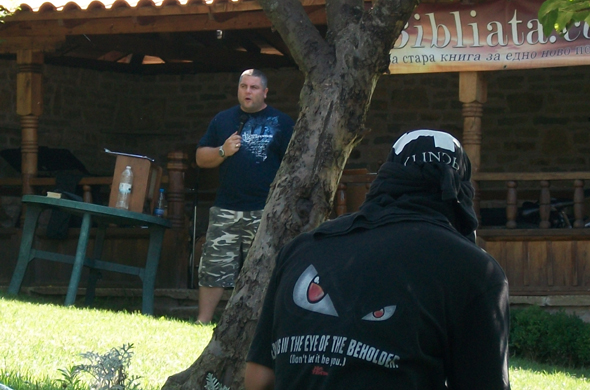
10:00 AM General Training Session
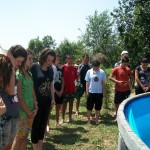


2:00 PM General Discussion/Water Baptism
4:00 PM Workshops in (1) Prayer, (2) Preaching, (3) Deliverance and (4) Missions
8:00 PM Evening Service followed by prayer at the alters until midnight
ALL ABOUT BIBLE CAMP 2011 BULGARIA:
BC/AD 2011 (Bible Camp/All Denominations) in Bulgaria – A Vision of Purpose
BC/AD 2011 (Bible Camp/All Denominations) – God’s Favor Realized
8 Simple Rules for Doing Missions in the Spirit
1. Never put a price on the human soul, which you are not willing to put on your own.
2. Unsubscribing from missions’ newsletters may result in unsubscribing from the missional letter of God.
3. By no means raise an offering because a missionary needs it, do so because it’s needed for the survival of the church.
4. Not giving to missions is far better, than committing to give without any intention to do so.
5. Before using a missions’ offering to pay a church bill, think of whose offering a missionary should use to pay their bill.
6. Don’t wait on a missionary to ask you for what God has already commanded you to give.
7. Pray for missionaries without ceasing. For it could be your prayer that saves a soul.
8. Never delay sending a missions offering for tomorrow. After all, it was you who preached that tomorrow may be when the Lord comes back.
New Church in the Spirit
The struggles surrounding the Bulgarian Confessions Act are not over. The search for a democratic paradigm which integrates religious freedom and freedom of conscience is not completed. As religious pluralism in Bulgaria occurs, unfortunately, in the forming postmodern context, the time has come for the Bulgarian Church to rediscover its historic identity by revisiting its Biblical theology. Common theological presuppositions presented within the faith of all Bulgarian Christians must lobby religious tolerance and create a healthy environment for the implementation of a new paradigm for ministry which will successfully incorporate interdenominational partnership.
The first step toward such a paradigm may have been made as Orthodox, Catholic and Protestant believers came together on October 23, 2004. In an “Universal Character of the Christian Church” round table discussion, they considered the possibility of the establishment of a religious community where Christians from various denominations can come together to worship in freedom from fear and according to their religious convictions.
As a direct result of the round table, on February 19, 2005 the participants came together again to establish a new church based on unity and tolerance. It was named, Christian Catholic (with the meaning of Universal) and Apostolic Church. Orthodox priests and protestant pastors came together to set forth into ministry the pastor of the new church the Pentecostal minister and scholar, Vili Altanov. The service was moderated by bishop Alexy Dardakius from the Russian Orthodox Reformed Church.
The participation of protestant and orthodox ministers in one church by itself is a global precedent. In Bulgaria it is an indication of religious freedom and tolerance. The new paradigm incorporates the protestant style of preaching along with eastern experiential theology. The church claims this is not simply a new form of institutional ecumenism, but a new paradigm for ministry in unity created by the Spirit.
The idea for the new formation comes from father Christo Pissarov, who was involved in the struggles for new social space within the Bulgarian Orthodox Church in 2004. According to him, this new paradigm of ministry does not purpose reform of any of the existing in denomination. On the contrary, it is an attempt of coming together in the Spirit and ministering in the presence of God in unity.


![9781418543341[1]](https://cupandcross.com/wp-content/uploads/2013/09/97814185433411.jpg)
